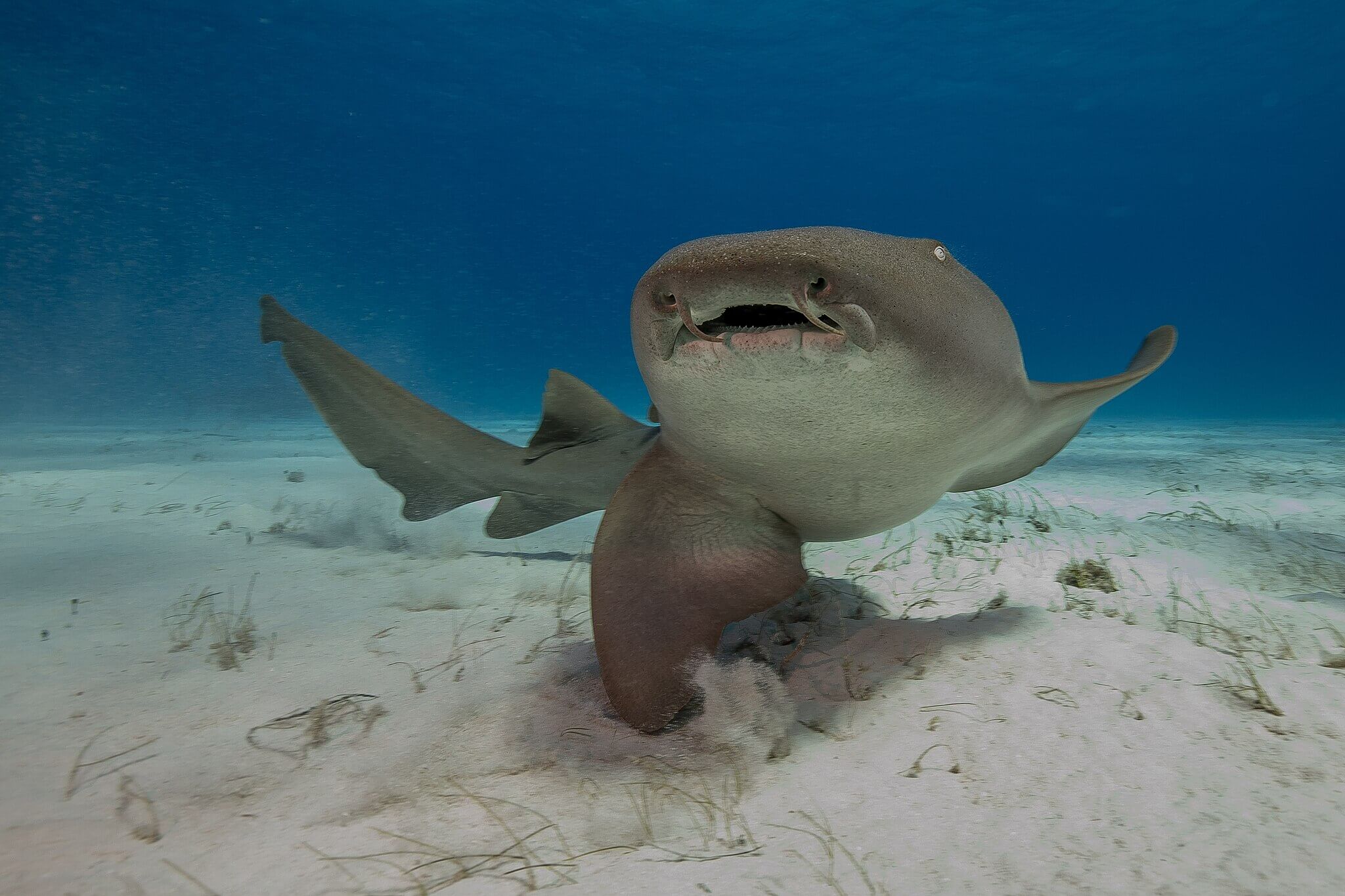Swimming with sharks may sound like an extreme idea, but that depends on the type of shark. One species of shark in particular, the nurse shark, has piqued many peoples’ interest.

Did you know that you can safely swim with nurse sharks? Nurse sharks can grow up to 7.5-9 feet long and weigh 165-230 pounds. Despite their size, they are considered to be gentle creatures and are not usually a threat to humans, making them ideal swimming companions for those looking to dive with sharks.
Nurse sharks are found in various locations around the world, such as the Bahamas, Cancun, and the Maldives. These tropical destinations offer plenty of opportunities for you to get up close and personal with these fascinating marine animals. While diving with them, you will be able to learn more about their unique characteristics and the importance of preserving their natural habitat.
Understanding Nurse Sharks
Behavior
Nurse sharks are a fascinating species that you might encounter while exploring coral reefs. They are typically nocturnal and their diet mainly consists of bottom-dwelling organisms. These sharks have strong jaws and can slurp up small stingrays, lobsters, and other crustaceans with incredible speed.
Though these sharks are primarily carnivorous, they are known for their docile nature and adaptation to captivity. Their social behavior ranges from being solitary to forming groups, which can make observing them even more interesting.
Classification
Nurse sharks are a type of carpet shark, and their scientific name is Ginglymostoma cirratum. They have a distinctive appearance, as they are usually brown or grayish-brown in color and may have a spotted pattern. Females tend to be slightly larger than males, averaging 7.5 to 9 feet in length and weighing between 165 and 230 pounds.
Habitat
Nurse sharks are common inshore sharks that live near the seafloor in the warm, shallow waters of the tropical and subtropical regions of the Atlantic and Pacific oceans. They like to inhabit areas with coral reefs, mangroves, seagrass beds, and other rocky environments that provide shelter and food, where they inhabit crevices and caves as they rest during the day.
Although their distribution is wide, nurse sharks face threats such as habitat destruction. By being more aware of these fascinating creatures and their needs, you can contribute to their conservation efforts by respecting their habitats.
Why Swim With Nurse Sharks?
Swimming with nurse sharks is an unforgettable adventure that allows you to get up close and personal with these fascinating creatures. While you snorkel or scuba dive, you’ll witness firsthand the beauty and grace of the nurse sharks as they glide effortlessly through the crystal clear water.
Imagine yourself diving into the clear blue water, surrounded by colorful coral reefs and fish. You see a group of nurse sharks gliding gracefully along the sandy bottom, their sleek bodies and long tails creating elegant curves.
They are one of the least aggressive species of sharks, which make them great candidates for swimming and interacting with humans. You approach them slowly and calmly, keeping a respectful distance. They seem curious and friendly, and some of them come closer to you, brushing against your skin with their smooth skin.
You feel a surge of adrenaline and awe, as you realize you are sharing this moment with these magnificent creatures. You watch them as they swim around you, their eyes glistening in the sunlight. You feel a sense of peace and wonder, as you witness the harmony and majesty of the underwater world.
Swimming Safely with Nurse Sharks
Swimming with nurse sharks can be an exhilarating experience, but safety for both humans and sharks should always be a priority. Here are some tips to keep in mind when swimming with nurse sharks:
- Research and Choose Reputable Operators: If you’re booking a guided tour, make sure to choose operators that prioritize safety and respect for marine life. Check for positive reviews and certifications.
- Avoid Touching or Feeding: As a general rule, do not touch, ride, or feed nurse sharks. These interactions can disrupt their natural behaviors and can be potentially dangerous.
- Stay Calm and Move Slowly: Quick movements can startle sharks and provoke defensive reactions. Move smoothly and predictably in the water.
- Maintain a Respectful Distance: Even though nurse sharks are generally docile, always give them space and avoid cornering them or blocking their escape route.
- Avoid Disturbing Resting Sharks: Nurse sharks are often found resting on the seabed. If you come across a resting shark, observe from a distance and do not disturb.
- Be Aware of Their Mouth: Even though nurse sharks are not known to be aggressive, they can and do bite when provoked or threatened. Their mouth, while small, is powerful.
- Wear Appropriate Gear: Use standard snorkeling or diving equipment, including a mask and snorkel or SCUBA gear, to ensure you can see clearly and move safely in the water.
- Be Mindful of Surroundings: While focusing on the sharks, don’t forget to be aware of your surroundings. Watch out for other marine life, coral, or changes in the current.
- Educate Yourself: Before going into the water, educate yourself about nurse sharks – their behavior, habitats, and characteristics. This knowledge can enhance your experience and ensure you act appropriately.
- Follow Local Guidelines: Different regions may have specific guidelines or rules for interacting with marine life. Always follow these to protect both yourself and the sharks.
Remember that wild animals are unpredictable. While nurse sharks have a reputation for being gentle, they are still wild creatures. Always prioritize safety and ensure that your interactions are not harmful or stressful to the sharks.
Popular Destinations to Swim With Nurse Sharks

In this section, we’ll go over some popular destinations where you can get up close and personal with these fascinating creatures.
Bahamas
The Bahamas is a top destination for swimming with nurse sharks, particularly around Compass Cay and Exuma Cays. At Compass Cay Marina, you can enjoy a dip with these gentle giants in crystal-clear waters.
Nassau and Big Major Cay, often referred to as Pig Beach, also offer opportunities for close encounters with nurse sharks as well as swimming with the famous pigs of Staniel Cay.
Hawaii
Although not as famous for shark encounters as the Bahamas, Hawaii, specifically the island of Oahu, is home to a variety of shark species, including nurse sharks. You can join snorkeling tours that take you to spots where you can observe these fascinating creatures in their natural habitat.
Mexico
Cancun offers thrilling experiences with these sharks, such as Experiencias Xcaret’s immersive shark adventure. During this adventure, you can swim freely alongside nurse sharks, creating unforgettable memories.
South Africa
Gansbaai, South Africa, is another location where you can snorkel or dive with nurse sharks. This destination is more famous for its cage diving with great white sharks, but if you’re looking for a more laid-back experience, swimming with nurse sharks is a unique alternative.
Australia
Australia offers numerous opportunities for swimming with nurse sharks, particularly in places like the Great Barrier Reef and Beqa Lagoon, where they are often spotted among the stunning coral formations.
Caribbean Islands
Besides the Bahamas, other Caribbean destinations, such as Belize and Costa Rica, offer the chance to swim with nurse sharks. In Belize, you can snorkel with these animals in crystal-clear waters, while in Costa Rica, you can explore their habitats around Cocos Island, located in the middle of the Pacific Ocean.
Frequently Asked Questions
Are nurse sharks aggressive towards humans?
Nurse sharks are not considered dangerous to humans due to their docile nature. They are a common sight in tropical and subtropical waters and are often favorites of divers and snorkelers. However, it’s essential to remember that they are still wild animals and should be treated with respect and caution.
Have there been any nurse shark attacks on humans?
While nurse sharks are generally not aggressive towards humans, there have been a few reported incidents. These incidents typically occurred when the sharks were provoked or felt threatened. So, as long as you maintain a respectful distance and avoid harassing them, the risk of any issues is minimal.
What precautions should be taken when swimming with nurse sharks?
Maintaining a respectful distance from nurse sharks is key to a safe encounter. Do not touch or harass them, as this may prompt defensive behaviors. Additionally, make sure to follow any guidelines or instructions provided by your tour guide, as they will have valuable insight into ensuring a safe and enjoyable experience.
How do local regulations or laws affect swimming with nurse sharks?
Local regulations and laws may vary depending on the location of your swim. Research the specific guidelines in the area where you plan to swim with nurse sharks. Additionally, it is always a good idea to choose a reputable tour operator who is well-versed in the regulations and can ensure that your experience is in compliance with local laws.
Sources:
